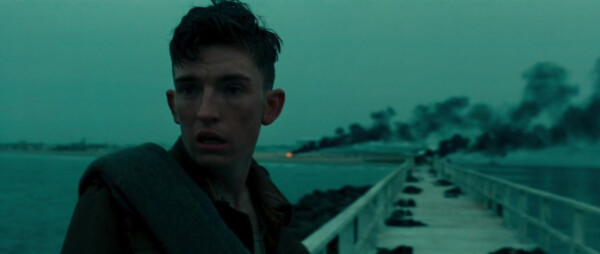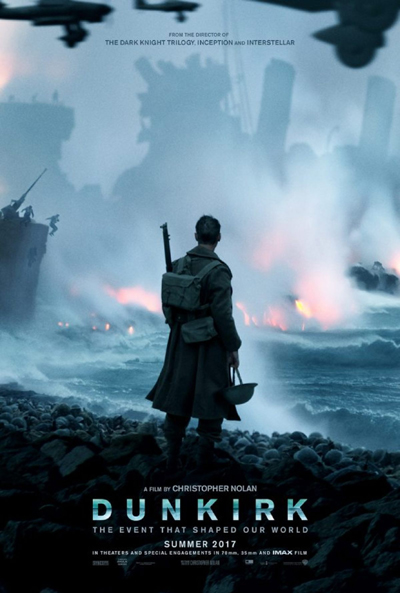Del reviews ‘Dunkirk’

Image courtesy of Warner Brothers.
“Dunkirk” Starring Fionn Whitehead, Damien Bonnard, Harry Styles, Mark Rylance, Tom Hardy, and Tom Glynn-Carney. Directed by Christopher Nolan. 106 minutes. Rated PG-13.
Del’s take
Christopher Nolan does not make movies. He builds monuments, towering edifices that reach for the heavens as intricate conspiracies of space and time that dwarf the efforts of mere mortal filmmakers. “Dunkirk” is no exception. Like its predecessors, “Interstellar,” “Inception” and even “Memento,” “Dunkirk” fits together with an old-school clockmaker’s eye for precision and a craftsman’s appreciation for complexity and detail.
It is an excellent movie, perhaps worthy of the Oscar talk surrounding it, and I wouldn’t mind seeing Nolan rewarded with a statuette. But for my purposes “Dunkirk” lacks a single ingredient, missing from all Nolan movies, that would make it the best film of the year.
The story is told from three different temporal viewpoints – a week, a day, and an hour – by multiple viewpoint characters. Foremost is an unnamed British soldier (“Tommy” in the credits) (Whitehead) who is desperate to escape advancing Germans and not above a peccadillo or two to get aboard a boat heading west. Others include Mr. Dawson (Rylance), who captains one of the small boats credited with saving hundreds of thousands of British and French soldiers from the beaches of Dunkirk. Tom Hardy’s role happens over a single hour as he pilots a Spitfire in battles with Messerschmitts, Heinkels and Junkers.

For those not up on their history, in the early days of World War II Hitler’s Germany, after finishing its conquest of Poland, invaded western Europe using a new fighting technique called “blitzkrieg,” or “lightning war,” where tanks and mechanized artillery, augmented by ground attack aircraft, moved at rapid pace to confuse and destroy opposing forces. In a few short days the Germans were able to surround the British and French armies that had deployed to northern France and Belgium, and threaten them with obliteration. Those armies had retreated to Dunkirk, where their commanders hoped the Royal Navy would carry them back to England. But the navy suffered grievous losses to marauding Luftwaffe bombers and U-boats and pulled their forces back. It was not until an armada of privately owned craft crossed the Channel did the soldiers find a way home – over 300,000 of them by the time it was over.
It may sound confusing, but the storytelling works itself out about mid-movie when you realize the three narratives are beginning to overlap and will presumably converge toward movie’s end. I’m not sure such a gimmick was necessary, but it does allow Nolan to focus on characters and not events, a characteristic of many war movies.
Acting was solid through and through. Newcomer Whitehead did a credible job, as did Styles in his role as a British soldier. Rylance proved again why he is an Academy Award winner, and his teenaged son, Glynn-Carney, rose above more experienced actors, such as Cillian Murphy.
The script was well written with only a few expository lapses here and there – Nolan loves to “explain” things or conduct info-dumps through dialogue. The score worked for me and visuals were mostly satisfying, although at times I could tell the difference between models or CGI and the real thing.
A few gripes: One subplot, where soldiers board a beached boat and wait for the tide to come in, goes on and on to the point of absurdity. And a historical error – Nolan has his Spitfires and Messerschmitts tangling at low altitude, only a few hundred feet above the waves. During the Dunkirk evacuation the air battles occurred at a much higher altitude, prompting British foot soldiers to ask, “Where was the RAF?”
My large complaint was with the strange lack of human warmth evoked by “Dunkirk.” Nolan, I fear, is more technician than artist, and as meticulous and grand as his movies may be, they don’t inform to the heart. The characters and their actions are merely a clockspring or spoked wheel in the Nolan gadget that tells a great story, but tells it mechanically. Call it the Uncanny Effect – it looks like human but is missing just enough to provoke a feeling of unease.
Still, “Dunkirk” is an excellent movie and you should buy a ticket and watch it in the movie theater, because that is where movies should be seen. Don’t be surprised if Nolan received an Oscar nomination for best director, nor should you be surprised if he wins. He is probably overdue.
If only Geppetto’s creation would discover that it is a real boy.
Del Stone Jr. is a former journalist and author.
![]()
Leave a Reply